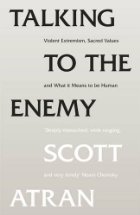 Anyone interested in learning how terrorists, in particular suicide terrorists and jihadis, think, will find a wealth of interviews with terrorists themselves, their families and friends, as well as studies of courtroom interrogations and police records, in anthropologist Scot Atran’s Talking to the Enemy. (Sam Harris has scoffed at Atran’s views, dismissing them as lunacy. Are terrorist really driven by a desire to enter Paradise? Do they really take up murder simply because they are the most sincere and devout of Muslims and simply because believe jihad is commanded by Allah? Does Atran really blame male bonding in soccer matches for terrorism! Perhaps this post will help shed a little light on where Atran is coming from.)
Anyone interested in learning how terrorists, in particular suicide terrorists and jihadis, think, will find a wealth of interviews with terrorists themselves, their families and friends, as well as studies of courtroom interrogations and police records, in anthropologist Scot Atran’s Talking to the Enemy. (Sam Harris has scoffed at Atran’s views, dismissing them as lunacy. Are terrorist really driven by a desire to enter Paradise? Do they really take up murder simply because they are the most sincere and devout of Muslims and simply because believe jihad is commanded by Allah? Does Atran really blame male bonding in soccer matches for terrorism! Perhaps this post will help shed a little light on where Atran is coming from.)
Here I outline the career, thoughts and feelings of one such interviewee as I came to understand him through the detailed interview and description of time spent with him by Atran. Most of the material is based on chapter 8, titled “Farhin’s Way”. Farhin is the Indonesian terrorist interviewee.
Of course this post can only be my own understandings based on my own reading of Atran’s book. To best grasp the character of Farhin it is best to read the book for oneself. One thing should emerge by the time one has finished this chapter (or even this post) — Farhin is driven by more complex motivations than the Islamic faith that millions follow today. Harris has even suggested it is the ecstatic hope of Paradise that drives suicide bombers. There is no place for such a simplistic (and fictional) view in Farhin’s mind. And the Farhin case study is found in many ways repeated many times over among the other terrorists whose lives we learn about in this book.
The chapter opens with a description of three Bali bombers who were executed by firing squad.
Their last social act while alive was to shout the words, “Allahu Akbar” (Got is Greatest), at their executioners, who then shot them each dead through the heart. (p. 119) Continue reading “Talking with a jihadi terrorist”
